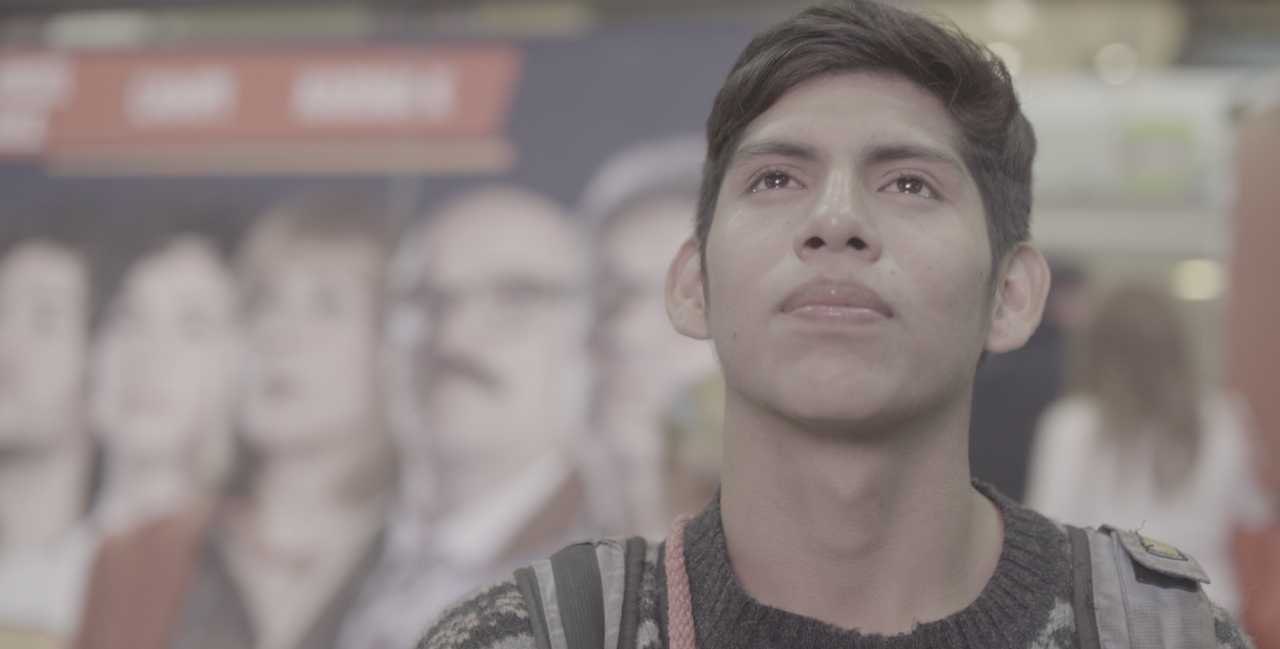
Agustín (Dylan Hurtado) © Migrant Stories
In the course of a suspenseful digital finale at die Seriale 2020 the festival came to an end by awarding the Best Series of the competition. While all participants had extraordinary stories to offer one did stand out winning our international jury over with a plot that is both “touching, well produced, and entertaining” and at the same time “gives an insight into a common and contemporary social topic”. We’re talking about Migrant Stories (2019), an Argentinian production with UN3.TV the channel of the National University of Tres de Febrero in Buenos Aires that premiered at this year’s Buenos Aires Series kicking off a run of victories with no end in sight.
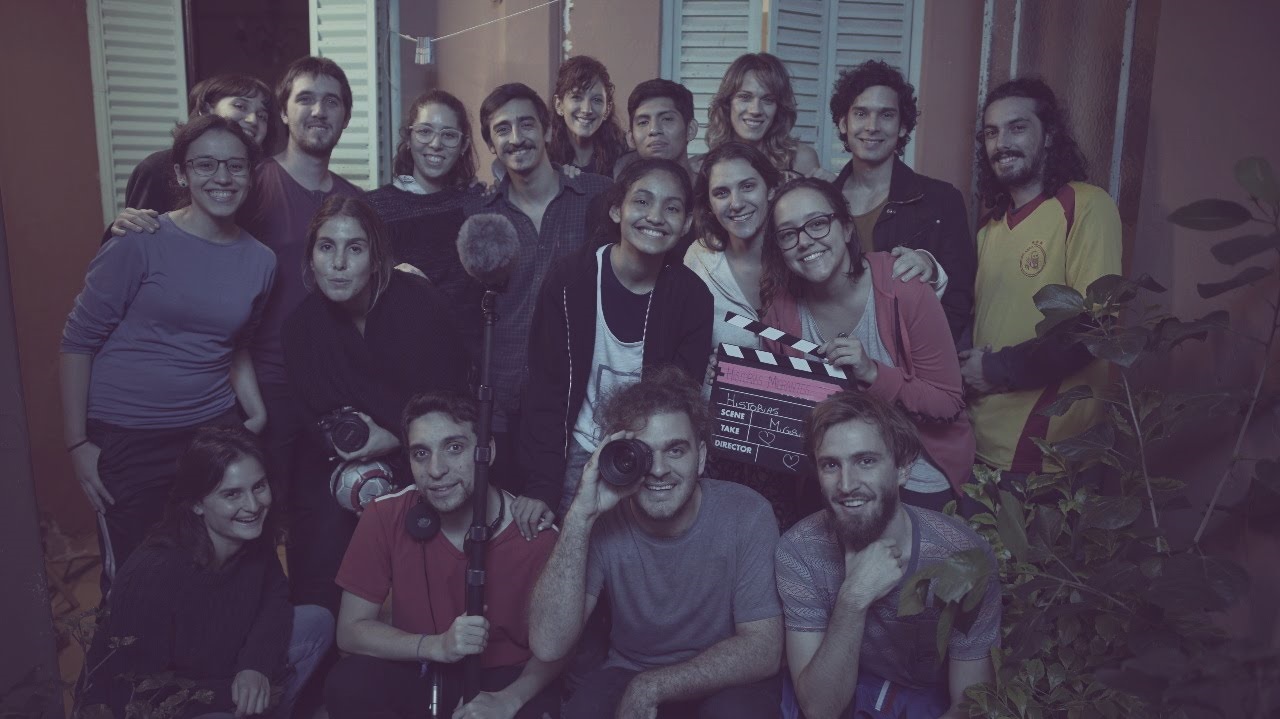
The team behind Migrant Stories. Screenwriter Melisa Vega with clapperboard and director Mariano Pozzi top row, 4th from left © Migrant Stories
For those who have not seen Migrant Stories yet, the premise of the story is quickly outlined. Four different people have one thing in common: They come to Buenos Aires from out-of-state or abroad striving to live a better life in the capital and are quickly confronted with the various obstacles of their endeavour. The series takes us on the journey of Agustín (Dylan Hurtado), a thoughtful young man from Bolivia seeking to study acting whilst lacking the money and credentials to get started easily; Amaral (Mariana Genesio Peña), a transwoman oscillating between sex work and her employment with a social organisation; the outgoing Pedro (Andrés Pabón), who left Colombia where he studied medicine and decided to start out from scratch trying to live independently; and the young woman Lucero (Camila Sosa), who is desperate to go back home after being trafficked to the capital to work in a sweat shop.
Through the closeness and intimacy with which the series encounters its protagonists, Migrant Stories is both an interesting coming-of-age drama in itself, but also so universal in its critique of racism, inequality and ignorance that its story could also take place in any other major city in the world. As the jury emphasises, the story illuminates “the uncertainty of what the next day brings and how people deal with their everyday problems under those circumstances.” Whether it is getting help from strangers, organising a place to sleep or finding a decent job to make ends meet, the basic needs of human life are harder to fulfil when you have to find your way around a new and often inhospitable environment on your own. But no one stays alone for long as Migrant Stories intertwines the journeys of its protagonists whose motives and actions bring them ever closer together. In this way, Migrant Stories creates a multi-coloured picture that is greater than the sum of its parts and shows us that isolation and despair can be overcome – through openness, solidarity and friendship. In this interview writer Melisa Vega and director Mariano Pozzi talk about the background of “Migrant Stories” and the quest of living together in a diverse society.
Seriale: Migration is one of the most relevant topics of today’s globalized world. In Europe there has been a lot of discussion on this topic in recent years mostly revolving around the issue of racism. Also the current situation in the US has broadened the view on what it means to live in a society that is deeply divided along the lines of skin colour and wealth.
So when it comes to your series Migrant Stories it feels like you are focusing mostly on social and economic issues. Do migrants from Latin American countries face this kind of “Othering” or even racism in Argentina as well?
Mariano Pozzi: Yes, they definitely do. Maybe in the series it is sort of subtle but it is one of the main issues: The idea of the show was to portray situations that happen every day for many immigrants especially from Latin American countries but also from other parts of the world.
Melisa Vega: We wrote this in 2017 and finished in early 2018 so the issue was not as publicised as it is today. But of course racism remains relevant and we wanted to show the little things that migrants go through and how different it is for them just because they are from another country.
Seriale: I am thinking of that scene in which Agustín is at Marthas grocery store for the first time. This random lady approaches him and thinks that he is working there even though he is just another customer. Is that this kind of situation?
Mariano Pozzi: Yes. Agustín is from Bolivia and in Argentina it is very common that vegetable stores are owned by Bolivians – just like supermarkets are often owned by Asian people. It’s something that developed in the wake of migration from those countries. And this white woman – as Melisa was saying – is committing some kind of “micro-racism”: She thinks that he looks Bolivian so he must be from Bolivia. Even though this is of course short-sighted as for instance the actor that plays Agustín, Dylan Hurtado, is actually born in Argentina but his parents are from Bolivia. Either way this random woman just assumes that he is working in the store because he looks foreign in a certain way.
Seriale: What has inspired you to choose that topic for your series? Did you talk to a lot of people that have to deal with this “micro racism” or did you experience or witness that in your own life?
Mariano Pozzi: We definitely did some research. This show was mainly produced by the Instituto Multimedia DerHumALC (IMD) a multimedia institute for human rights that also hosts the International Film Festival on Human Rights in Buenos Aires and Santiago del Estero. Because of that, we were able to review a lot of content, especially documentaries, about this issue as a basis for our research. We got in touch with social and legal organisations and we researched articles and stories in the media. So of course it is not strictly based on these stories but definitely inspired by them. Since it is a very sensitive topic we wanted to treat it with the appropriated amount of respect and preparation.
Melisa Vega: The original idea is from Mariano and when he approached me to help him write the script we were talking a lot about this “micro-racism”. But we do not have any personal experiences with it because we are not immigrants. So we got in touch with those organisations as we wanted to get informed about it to show it the best way possible.
Seriale: Unfortunately migration often goes along with a pressure to justify its reasons. In my view the background story and the specific reasons for the immigration of the main characters remain mostly unexplained except from their overarching motivation to life a better life. Was it an intentional decision to leave this background aside?
Mariano Pozzi: Sort of a complicated answer: Yes and no. Of course we wanted to give some background information on their stories but we also knew that we had little time to do so. It is a short format which means that we did not have eight episodes just to focus on one character. So we could not give as much background as we wanted to. We tried to incorporate background information with these short clips at the beginning of each episode telling how each of them arrived in the city and by other informative dialogs.
Seriale: So it was more of a pragmatic approach than a tool for the story.
Melisa Vega: Yes. And when it comes to the story the focus was on their present situation:
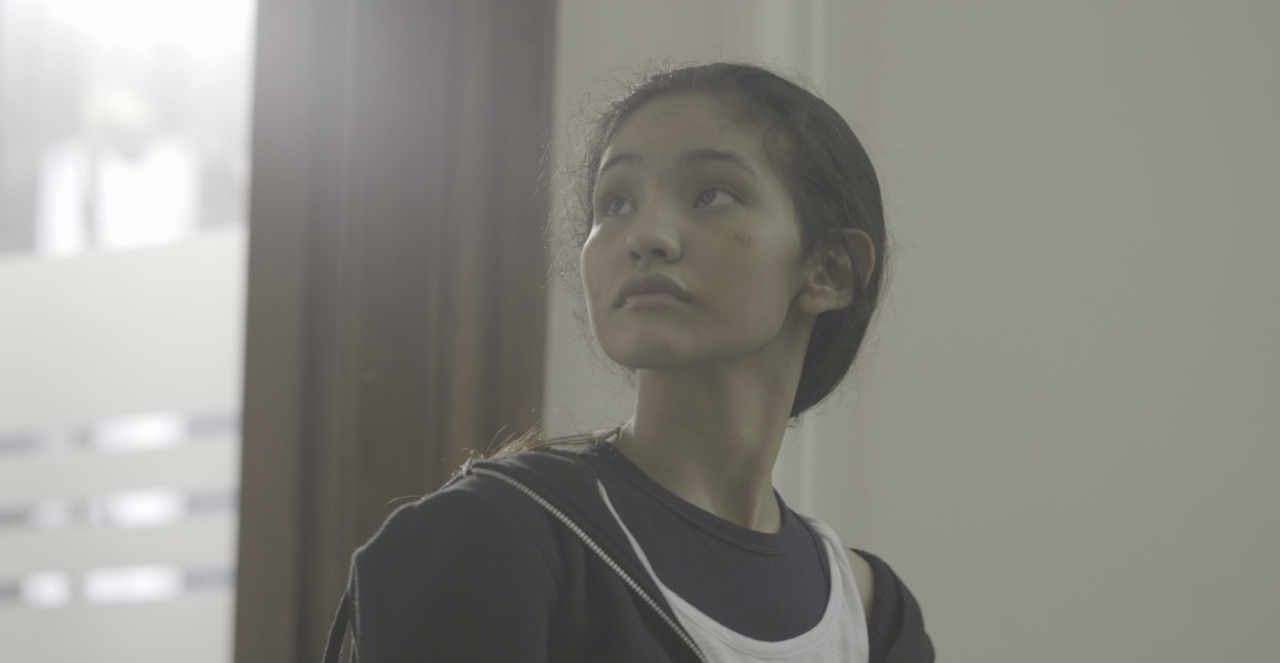
Camila Azul Sosa (Lucero) © Migrant Stories
Seriale: Like in the first scene where Agustín arrives in the city and strolls around being amazed by the lights of shops and advertisements. Maybe he is feeling a new sense of freedom and possibilities, but then he gets his wallet stolen and you realize that with the money he just lost an important entry ticket into that world. In general I feel like hope and despair are very close together in the series. Like when Lucero is assaulted for her passive resistance in the sweatshop but then makes an escape and runs away. What is the driving force behind these sudden changes of action and emotions? Is it coincidence, fortune or something else?
Mariano Pozzi: First it is due to the short format in which we wanted to be dynamic and entertaining. So a lot is based on action – not as a genre but as a relation of cause and consequence that we developed in the script. On the other hand, it is not as much fortune as it is action driven by the actors. They are all struggling, they want to change their life for the better and we wanted to show their agency in that and didn’t want them to be passive. So they are trying to go to school and find a better job. Mind that this is not a speech for meritocracy because there are many others that are struggling and have less chances – but we wanted to be hopeful.
Melisa Vega: When we started our research and had the first versions of the script done it was a very different story. We then decided to focus on their possibilities instead of being all sad about their backgrounds and why things did not go so well for them. And I think they can always do well if they are treated equally.
Seriale: So this was also a way of treating your characters equally and empowering them?
Melisa Vega: Yes!
Seriale: Besides the empowered individual, community seems to be of some importance, too. One of the first scenes of the series is located in a subway train where Agustín, Pedro and Lucero are close together without yet knowing each other and what they have in common as migrants. Later on they eventually bump into each other and form a sense of solidarity. So there is this message that even though you start out alone in a new environment you do not have to make it on your own eventually?
Melisa Vega: Exactly! When we talked to migrant organisations for research it is a very common thing that migrants help other migrants. So we wanted to reinforce the idea that together you can definitely make it better.
Mariano Pozzi: And it is also a critique towards people who live here – born and raised – how easy it is for us to look the other way and not to help others who have less and are struggling to make a living.
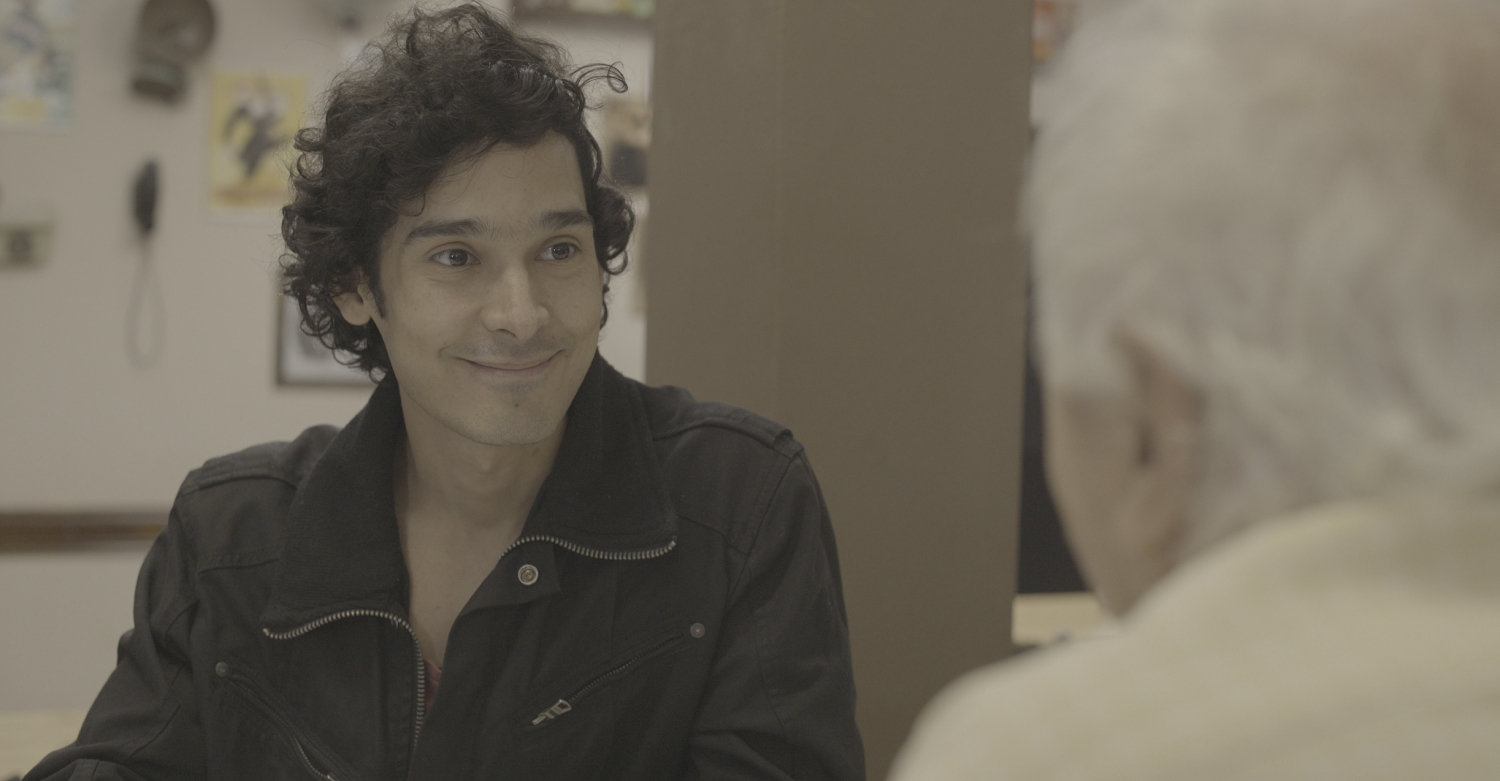
Andrés Pabón (Pedro) © Migrant Stories
Seriale: At the same time even the protagonists have different capabilities and means based on their character and background. For example when comparing Agustín and Pedro. What are your thoughts on that?
Mariano Pozzi: Well, you can read their backgrounds as different social class. Their arrival in the city and their first steps of making a living for themselves are basically mirrored in the first two episodes. Pedro is staying in a good hotel and his parents sent him money and Agustín is struggling with less in a crappy hostel.
Seriale: One arrives by plane and one by bus.
Mariano Pozzi: So they definitely come from different backgrounds and still they find this common ground where they can relate and bond. Actually all the four of them came from very different places.
Seriale: Whenever the title of a book is shown in a film you’re wondering whether there is some deeper meaning to it. So when Agustín is arriving in Buenos Aires he’s reading “King Lear” by Shakespeare. Is there a hidden connection to the theme of the series or is that random?
Mariano Pozzi: Yeah, I have to be honest about that: It is random. But of course it gives information about his character. Later on he tries to pay for the hotel room with his book. So it has value to him and we understand that he is into the theatre and classical stuff. So it is important for the object and not for the title itself.
Seriale: Let’s talk a little bit about Lucero because the boys seem to be relatively free on their journey but she’s in a very different spot. Lucero first has to free herself from the sweat shop of her traffickers where she’s working as a modern slave. Do you think it is harder for female migrants because they are facing even more threats than their male counterparts?
Melisa Vega: Yes! We had the statistics at the time and we wanted to tell Luceros story because it is a remarkable thing that still happens today. There are sweatshops and girls are being trafficked from other countries or even other regions of Argentina – like in the case of Lucero. They are brought to Buenos Aires under the false pretext that they will be given jobs, a decent living or the opportunity to study. But then they end up like modern slaves and they take away their documents so they can’t move around. So we did our research on that issue and wanted to raise awareness that this happens.
Mariano Pozzi: As Melisa said, we wanted to show that migration exists not only in between countries but also from state to state, from city to city. And Luceros case is definitely in the harsher storage. But it is very common here for this kind of human trafficking but also for forced prostitution that female migrants are not in a good spot.
Seriale: You mentioned that Lucero was trafficked from within Argentina. We get to see that her passport was taken away and eventually she gets a new one even though now it has a different name on it. But as she is from Argentina she would not even need an ID to get back home, right? What is the rational here?
Mariano Pozzi: The way these traffickers and illegal businesses work is that they play with your psychology. They harass you and strip away your rights or even your identity. Sometimes they just keep your documents, then they give it back for specific occasions, sometimes they change up your name. These are just a few ways they use to control you beyond just locking you up. And of course Lucero also needs an ID for when she goes to the vegetable store. She could be stopped by the police who could get suspicious if she does not – but then at least they would not have her real name. The same holds true in case she’d go to the police station to press charges. So these are many levels of control that include even changing your identity.
Seriale: Let’s talk a little about the history of Argentina. The past has been shaped by political conflicts between the left and right, military regimes and violent conflicts with neighbouring countries. In recent times a dominant issue seems to be the economic situation of the country, its debt with foreign institutions and the politics of austerity that led to severe cuts in government social and cultural spending. On the other hand Argentina is well known for its cultural landscape, its theatre, literature and arts. As creatives within the cultural sphere of Argentina: How are you affected by that past and present?
Mariano Pozzi: Well, it is a complicated question. Of course that is just my view on our recent history. The last 40 years since the end of the military dictatorship until today have shaped a country with many conflicts and concerns about human rights. This is something very important to portray every day as a form of practicing memory so we do not do the same mistakes again. This also applies to the economy and social issues. That is why we march every year for many things. It is a very politically involved country, thankfully. Regarding the past history we are a country of immigration which is also shaped by colonization. There were people here before that are in a part our ancestors and many people have mixed ethnic influences in their heritage. I have origins in Europe, I have origins in Asia, and I have origins with Native Americans – probably Melisa as well – and I can say this from about 95% of Argentinians. It is a very diverse country and population. So that shapes the way we think, create and write. When it comes to the economy we are in a bad spot right now and the global pandemic is not helping.
Seriale: And the possibilities for financing and producing digital series or other cultural products?
Mariano Pozzi: It is very hard to finance anything that is sort of independent. There is some help by the government or philanthropic organisations but, as you have said, there are many artists here – creators, writers, filmmakers and very diverse cultural movements and organisations. So there is never going to be funding for everybody and especially the little ones are struggling to make productions with a low budget independently.
Melisa Vega: I think we are kind of experts already in realizing projects with very small amounts of money. For “Migrant Stories” we shot eights episodes in eight days and we could not really afford another second of production, literary! So you constantly have to make decisions. Also it is really hard to make products, like “Migrant Stories”, that have a social impact because of the challenge to get people interested in funding. We made the experience that nobody really wants to see people from other countries struggling in Buenos Aires. Commercially speaking it is not a no-brainer topic that is going to find money easily.
Seriale: Do you think the mainstream taste is more interested in feel-good-entertainment?
Melisa Vega: For a long time we had a lot of content about the Malvinas War in 1982 and the military dictatorship as it is really our recent history. And as creators we want to reflect on that and show the world our struggle. But of course people also have Netflix and HBO and it is getting harder to get people interested in stuff like the national history.
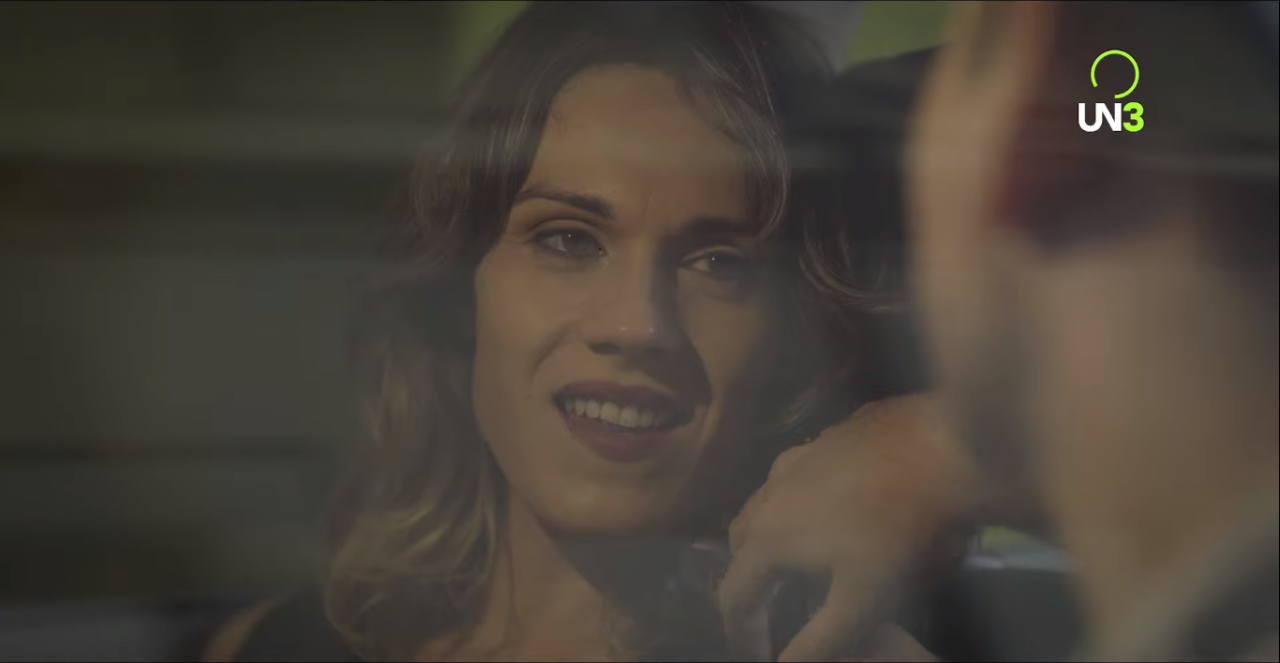
Mariana Genesio Peña (Amaral) © Migrant Stories
Seriale: A legacy of that history might also be the way the police uses or abuses its power which is reflected in the story of Amaral, who by the end of the story is beaten down by an officer while trying to save Lucero, Agustín and Pedro from the police. So we did talk a lot about the issue of migration, but how political was the series meant to be in this regard?
Mariano Pozzi: Very! To be honest if we could, we would have made it even more political. Of course there were budget issues and we had to downgrade some scenes. The last one with the police was meant to take place in a crowded space with lots of police cars and in the end we made it a little smaller. But that’s something that happens and, as Melisa said, we shot the show in March 2018, finished it by mid-2019 and started showing it this year on Buenos Aires Series being the first and die Seriale being the second festival – hopefully many others to come – and the topic is more present than ever. Look at what’s happening in the world, with George Floyd in the states.
Melisa Vega: And with trans-lives! The story of Amaral shows that, too.
Mariano Pozzi: Yes. The abuse of police power is a common issue especially with underrepresented and historically oppressed groups like immigrants, trans-people, the LGBTQ-community. So we couldn’t just make a show about immigrants without having that perspective, too.
Seriale: In my view, another theme of the show seems to be the concept of debt. It seems to play a key role for the personal relations of the protagonists as it touches on the very aspects of making a living. Sometimes it is about owing money, sometimes it’s about giving each other favours. What is your view on that?
Mariano Pozzi: If you are referring to bonds of solidarity, we wanted to show how we need each other’s support – financially and emotionally. Sometimes it’s about lending money, sometimes about giving somebody a place to sleep or a job. In general it’s about trusting and helping each other out. I do not think anybody can make it alone in this world. I think the concept of “just work hard enough and you’ll make it” doesn’t hold true – again speaking against meritocracy. Especially when you are an immigrant and especially when you are on your own. We need each other!
Seriale: What a lovely note to end this interview on! I think you did a good job in getting that message across in the series. However we have one thing left, which is to look into the future a little bit: As the series was that successful winning awards at Buenos Aires Series and die Seriale festivals, are you going to continue the story for a second season? Is there funding?
Mariano Pozzi: Yes, we are going to do it! No, we don´t have the funding, yet! But we are used to the practice of finding a way. We went to two festivals and we won both of them so we’re grateful for that and we hope to continue in that manner. The show as a TV concept is supposed to last for many, many seasons. At some point we were offered to write an ending that would be conclusive in case we wouldn’t be able to make a second season – but we denied. Melisa and I felt very strongly that we want to have an open ending to have the possibility to make at least a second season!
Melisa Vega: And I think a lot of time has passed since our first writing and if we can write and move into production this year we will make a second season that includes many other points of views that we have left out, or that even deal with the situation of the world right now. We had very positive feedback and we hope we can get post-pandemic-world-money to do it!
Interview by Robert Wolff
Migrant Stories (Historias Migrantes) (2019)
Country: Argentina
Genre: Drama
Runtime: 8 Episodes, 8 min.
Director: Mariano Pozzi
Writer: Melisa Vega, Mariano Pozzi
Producer: Marina Marin, Natacha Bucatari, Maximiliano Rottjer
Cast: Dylan Hurtado (Agustín), Mariana Genesio Peña (Amaral), Camila Azul Sosa (Lucero), Andrés Pabón (Pedro), Romina Escobar (Susi)
